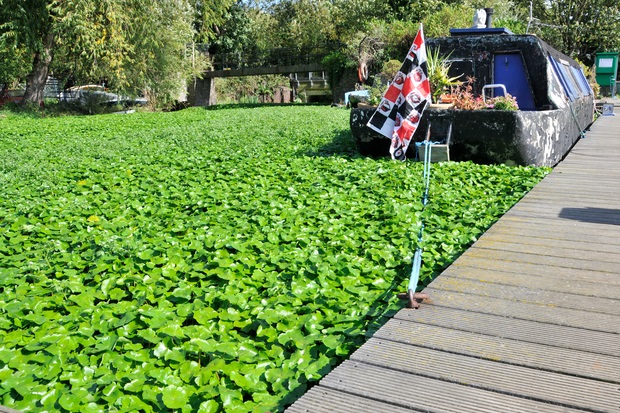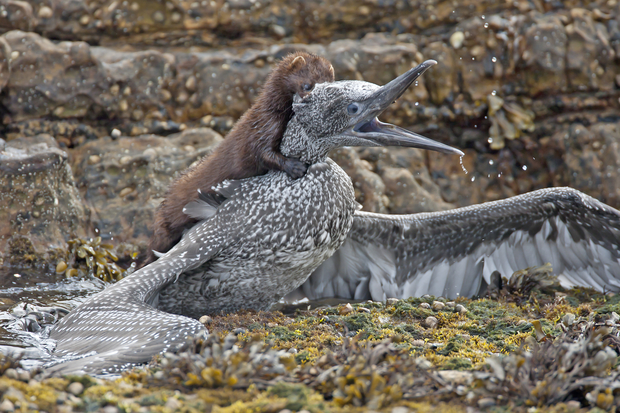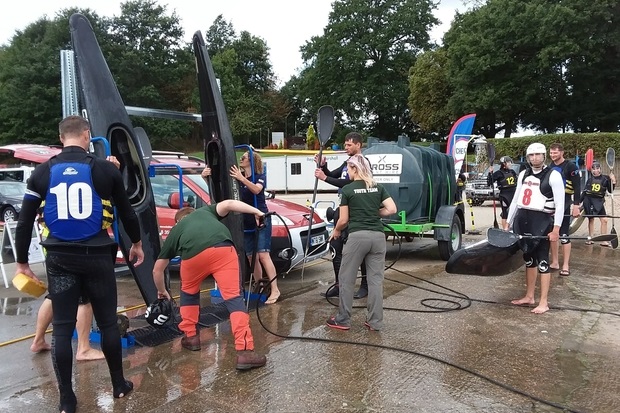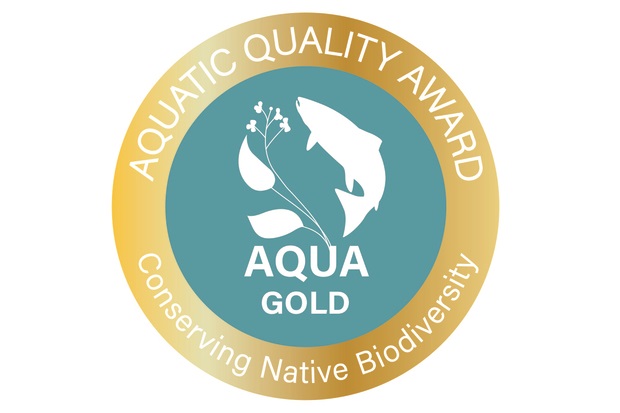
24-30 May is the sixth annual Invasive Species Week, led by APHA’s GB Non-native Species Secretariat (NNSS).
Organisations across the UK, Ireland, the Isle of Man, Guernsey and Jersey are working together on a week of action to raise awareness of invasive non-native species, their impacts, and the simple things that everyone can do to help prevent their spread. This year most events will be taking place online, but we will also be sharing five simple actions that everyone can take to help protect the environment.
What are invasive non-native species?
Over 2,000 plants and animals have been introduced to Britain from all over the world by people. These are known as non-native species. Most are harmless, but 10-15% spread and become invasive non-native species which can harm:
The economy
Invasive species cost the British economy over £1.7 billion a year. Costs include damage to buildings and infrastructure, interference with the production of food and materials, delays to work, costly controls of established invasive species.
Our health and quality of life
Some are irritants of our skin or respiratory system, cause road traffic accidents, or are pests in our homes. Others increase our risk of being flooded, or prevent us from enjoying recreational spaces and activities such as kayaking and fishing.

Wildlife and the environment
Invasive species are one of the top five causes of biodiversity loss worldwide. In Britain they harm native wildlife by damaging habitat, preying on or out-competing other animals and plants, and spreading disease. Their impacts are felt across a range of important environments and can affect important ecological processes such as the formation of peat, a vital carbon store, and the overall health of the environment.
Invasive species reduce the ability of native wildlife to cope with other environmental pressures such as climate change and habitat loss. These pressures can also make it easier for invasive species to establish.
How are invasive non-native species spread?
Some invasive species have been deliberately introduced to the wild, while others have been accidentally spread, for example as ‘hitch-hikers’ on equipment or clothing used in a waterbody. They can be spread from our homes and gardens, if unwanted pets are abandoned in the wild or garden waste is not disposed of responsibly.
The number of new species being introduced to Britain is already increasing rapidly. Climate change may increase the ability of new species to establish and allow currently benign species to become invasive. If we do not act, the problem of invasive species will continue to escalate at an ever increasing rate, causing us to feel more of the impacts and incur more cost every year.
What is biosecurity?
You may have heard of the term ‘biosecurity’. This means measures to prevent new threats from invasive plants and animals being introduced from abroad, and already present species from being spread. Improving our biosecurity will help us to slow the spread and prevent costs and impacts from escalating.
Vulnerable habitats
Some habitats are more at risk than others. Our lakes, rivers, and seas are particularly vulnerable to invasion due to their interconnectivity and widespread use for recreation and business. Freshwater and marine non-native species are more likely to be invasive than those that live on land. Some freshwater species can survive out of water for over two weeks on damp clothing, boats or equipment, making it easy to spread them from one waterbody to another.
Invasive species are one of the top threats to biodiversity on small islands around the world. The wildlife they support has evolved away from many predators, competitors and disease so lacks natural defences against new threats. The introduction of rats, mice, and mink to islands all over the world has contributed to declines and extinctions of a number of rare bird species.

APHA are involved in a number of projects to strengthen biosecurity in the aquatic environment, and on the small islands of the UK Overseas Territories. Read more on these projects below.
Strengthening aquatic biosecurity
One of the sectors most impacted by aquatic invasive species is the water industry. Quagga and zebra mussels form large colonies which block pipes and other infrastructure, and invasive plants clog reservoirs. The annual cost of invasive species to water companies is at least £7.5 million, and expected to rise.
Nine water companies have invested £106k per annum for five years from 2020-2025, to tackle aquatic invasive species in England by enhancing the Check, Clean, Dry campaign.
The NNSS is leading on the delivery of the work programme, supported by water companies and Check, Clean, Dry partners including the Angling Trust, British Canoeing and Royal Yachting Association who contribute their time and expertise, and educate their members. The work programme covers five key areas, including reducing the risk of new species being introduced from abroad. We run an annual six month Check, Clean, Dry border biosecurity campaign between March and September to remind recreational water users travelling abroad to return with clean kit to prevent the introduction of new invasive aquatic species. Find out more about the project.

Rewarding good biosecurity practice
To support us in disseminating Check, Clean, Dry materials and encourage water asset managers to go further to improve their biosecurity, a recent APHA led project, RAPID LIFE, developed an accreditation scheme. Alexia Fish, RAPID LIFE project manager, explains:
AQUA (Aquatic Quality Award) is a way to reward water asset managers for excellence in biosecurity and be recognised as actively conserving their site to maximise native aquatic diversity. There are three levels of the award: bronze, silver and gold - so there is opportunity for participants to gain a bronze level of accreditation and work towards the silver and gold levels. The scheme has been designed to be flexible and has the capacity to be tailored to different sites, to maximise the number of sites that will be eligible for accreditation. We are currently evaluating the success of the pilot scheme in the South West region of England and hope that we can secure more funding and expand its roll out.
AQUA was run by Bristol Zoological Society alongside South West Water and APHA through the RAPID LIFE Project. Find more information on AQUA and the RAPID LIFE project.

Biosecurity in the UK Overseas Territories
The UK has 14 Overseas Territories (OTs) and three Crown Dependencies, most of which are islands. The OTs account for 94% of the UK’s unique biodiversity and are vital habitats with species that are found nowhere else on earth.
Invasive species are the greatest environmental threat to the OTs, and a risk to food security and sustainable development. However, most of them have limited capacity to act and require support to develop measures to reduce the risk of future invasions as well as to manage existing ones.
In 2016 the NNSS secured funding over four years (2016-2020) under the Foreign, Commonwealth & Development Office’s Conflict, Stability and Security Fund (CSSF) to develop comprehensive biosecurity for the OTs by providing them with access to UK expertise on risk analysis, pathway management, pest identification, horizon scanning, contingency planning, rapid response capability and species management. Through this project the OTs have scientifically strengthened their defences against invasive species. See highlights from the project and read the report.
What can I do to help?
There are five simple things that everyone can do to help protect the environment:
- Keep any boats, clothing, footwear and equipment used in water free of invasive species – remember to Check Clean Dry after use. It is important to follow a good biosecurity routine when you are working outdoors too.
- Be Plant Wise and do not let your garden, pond or aquarium plants enter the wild.
- Take care of your pets, never release them or allow them to escape into the wild. It is cruel and could harm other wildlife.
- Look out for Asian hornet and other alert species. Read more on Asian hornet and how to report sightings, and download the Asian Hornet Watch app. Free identification sheets are available to help you.
- If you enjoy being outside why not join a Local Action Group working on invasive species management? You could get your team together and use your volunteering days to help. Look out for details of a new initiative, launching Tuesday, to help tackle floating pennywort across the country.
If you are interested to learn more about how you can help, join one of our free webinars this week. If you miss out, you can catch up online.
Monday 24 May
13:00-13:30 Webinar: Why bees are so important, and how to help protect them from the threat of Asian hornet. With APHA’s National Bee Unit.
Wednesday 26 May
13:00-13:45 Webinar: Biological recording – how your nature sightings can help scientists working on non-native species issues. With Professor Helen Roy, Centre for Ecology and Hydrology.
Thursday 27 May
13:00-13:45 Webinar: Wildlife friendly gardening with non-invasive plants. With Katharina Dehnen-Schmutz and April Webb, Coventry University.
Find out more and see what else is taking place on the Invasive Species Week website or on Twitter @InvasiveSp, #InvasivesWeek and #GetINNSvolved.

Recent Comments